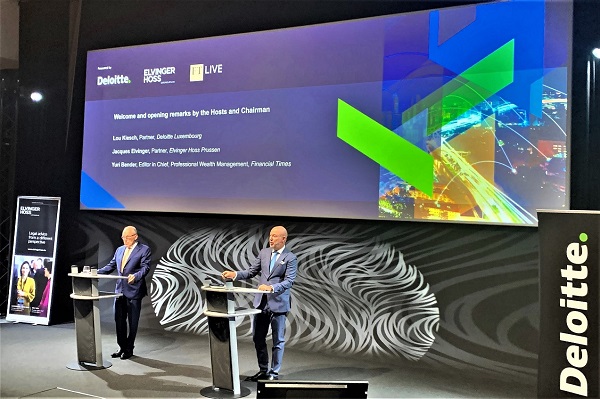 Co-hosts Jacques Elvinger (Elvinger Hoss Prussen) and Lou Kiesch (Deloitte);
Credit: Deloitte
Co-hosts Jacques Elvinger (Elvinger Hoss Prussen) and Lou Kiesch (Deloitte);
Credit: Deloitte
Deloitte Luxembourg and Elvinger Hoss Prussen, in collaboration with Financial Times Live, held the ninth edition of the annual Cross-Border Distribution Conference on Tuesday 9 February 2021.
The event, run digitally this year, gathered leading regulators, asset managers and experts to address key developments in both fund distribution and the wider investment management sector. Traditionally a European-centric conference, its virtual nature provided an opportunity to connect with a more global audience online. As such, the diverse programme featured a line-up of internationally renowned speakers covering industry topics across Asia, Europe and the United States (US).
Facing new challenges in the wake of Brexit and a new US administration, more than 1,300 senior fund professionals from 80 different countries connected at this year's virtual Cross-Border Distribution Conference to take the temperature of the global fund industry.
Exploring how Brexit has altered fund distribution from the European Union (EU) into the United Kingdom (UK) was a leading agenda topic. The panellists discussed not only how Brexit would affect Luxembourg and the rest of Europe, but how the Luxembourg fund industry can further maximise interest from the UK, the US and beyond.
The conference also explored the US election’s potential impact on the global industry. A specialist panel addressed how the US and Asia expect trading relationships to change including interaction on which global regulatory developments will influence international trading patterns and fund distribution.
Lou Kiesch, Partner and Regulatory Consulting Leader at Deloitte Luxembourg, commented: “Brexit and the US elections will not only have implications on international trading patterns but also the entire investment management industry. While it is too early to assess, foresee or predict the long-term effects, some short-term effects are already noticeable. Indeed, only UCITS and AIFs, which were previously marketed under the available EU passports before the end of the Brexit transition period, may continue to benefit from a grandfathering period. For all other funds that now wish to access the UK market, the only way to distribute is by triggering a much more complicated and burdensome process”.
The morning panel discussed how Luxembourg could continue to leverage its strong relationship with Asia to further harness the market’s potential. The debate also covered on how the crisis has transformed Asia’s distribution landscape, how European managers and distributors can capitalise on the area’s digital technology boom and the opportunities that the Greater Bay Wealth Initiative presents.
As diversity and racial justice issues continue to make headlines, the conference also explored the fund industry’s response and how it must adapt and support the drive for greater equality through its own operations and environmental, social and corporate governance (ESG) investing.
“While the need for appropriate diversity is long recognized by the asset management industry, the achievement of this goal is still too far off. In my view, ESG and diversity have one thing in common: they should develop naturally by all actors recognising that they are determining factors for the success of any business,” explained Jacques Elvinger, Partner at Elvinger Hoss Prussen and co-host of the conference.
During the full-day event, delegates also gained insights into current geopolitical subjects and ESG regulatory developments, what experts believe to be the future of the industry.








